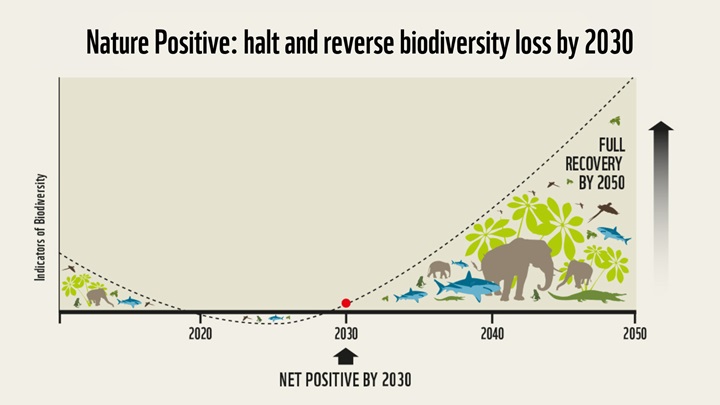Resetting the economic game in nature’s favour
Although companies are generally more aware of the climate crisis and are starting to set strategies to manage their carbon footprint, considering nature in goal setting and solutions should be equally essential to their plans.
The UN Environment Program estimates that declines in nature and biodiversity at current trajectories will threaten to reach at least 35 out of 44 of the targets of SDGs.
Eva Zabey, CEO of Business for Nature, a global coalition of more than 90+ partner organisations driving credible business action and policy ambition to achieve a nature-positive economy for all by 2030, says:
“Nature and climate action go hand in hand, and this is why we see nature becoming increasingly central to climate discussions.”
With more than twenty years of working at the nexus of business and nature, her expertise furthers Business for Nature's mission to encourage corporate leaders to accelerate their commitments to biodiversity and support governments in setting ambitious national and global policies in favour of nature.
They collaboratively work on advocacy projects while empowering business action with the support of their partners and leading companies.

Their campaigns are making a tangible difference, such as the `Make it Mandatory` initiative, which rallied over 400 businesses with over $2tn in revenues to join forces prior to COP15, the UN`s Biodiversity Conference in 2022.
Supported by its partners, the organisation collectively called on governments to pursue a more ambitious `deal for nature` in designing the Global Biodiversity Framework, also known as the Biodiversity Plan, by making nature-related assessments and disclosure mandatory.
Their success and the result send a clear message to large businesses and financial institutions to start assessing and disclosing their risks, impacts, and dependencies on biodiversity, as governments will require them to do so by 2030 at the latest.
The upcoming COP16 will be held in Colombia in October 2024, and Eva explains why it will need to delve deeper into how nations will meet the targets adopted at COP15.
“It will be a key milestone in taking stock of progress and setting the standard for all countries to deliver the Biodiversity Plan. It will be an implementation COP, with countries publishing and showcasing updated National Biodiversity Strategies and Action Plans (NBSAPs).”
She adds that once published, NBSAPs will be implemented through national legislation and regulation that will have direct impacts, opportunities and obligations for businesses.
Business for Nature will collectively urge the adoption of a whole-of-society approach to delivering the mission of the Biodiversity Plan, which aims to halt and reverse nature loss by 2030.
On a practical level, the organisation has developed tools, guidance and campaigns to encourage more companies to transform their business models and value chains.
Developed in collaboration with leading organisations, including the Taskforce for Nature-related Financial Disclosures framework (TNFD), the Science Based Targets Network (SBTN) and the World Business Council for Sustainable Development (WBCSD), they published the `high-level business actions`, also known as the ACT-D Framework, which stands for the Assess, Commit, Transform and Disclose method.
It provides a structured approach for companies seeking to embed nature in their decision-making, minimise their impacts, and contribute to transforming our economic and financial systems.
Building on the ACT-D framework, they also collaboratively developed tailored guidance for 12 distinct sectors, highlighting each sector’s impacts and dependencies on nature, including hands-on examples and recommendations
A joint global campaign, `It`s Now for Nature`, was launched to amplify their message and get more companies involved in developing and sharing credible strategies using a Nature Strategy Handbook that spotlights best practices and provides practical step-by-step guidance.
Eva explains the importance of this campaigns:
“Rewriting our global economy’s ‘rulebook’ is essential to create a level playing field and enable business and finance to take action at the pace science demands.”

Eva strongly believes that companies should act immediately, highlighting that developing nature strategies takes time but that companies that start now will stand to benefit vs those that wait.
“There is a huge amount of help and support out there, and delaying action will lead to more acute risks, and making changes will become even harder to implement. The Biodiversity Plan sets the goal and roadmap, and with new tools and leadership from pioneering companies, every business can now join the collective shift to a nature-positive, net-zero and equitable future."
"Becoming nature-positive is a global goal aiming to halt and reverse nature loss by 2030 on a 2020 baseline and achieve full recovery by 2050, which is practically the nature equivalent to climate’s net zero goals."
She further explains that nature-based solutions can provide a third of the climate mitigation needed, and the world’s oceans, plants, animals, and soils are estimated to absorb half of the human-related carbon emissions over the past decade.
Therefore, valuing and embedding nature in their decision-making will help businesses and economies reach their net-zero goals.
A strong movement gaining momentum is the Nature Positive Initiative, which aims to preserve the integrity of ‘Nature Positive’ as a measurable 2030 global goal for nature for business, government, and other stakeholders. They provide tools and guidance besides advocating for the full implementation of the Biodiversity Plan, otherwise known as the Kunming-Montreal Global Biodiversity Framework, by governments and other stakeholders.

According to Eva, there is a growing community of companies that recognise they need to scale and speed up their action on nature and want to be open and transparent about their efforts.
She believes their 'It's Now for Nature' campaign offers a public platform to get more engaged.
“Indeed, voluntary business action is and will remain insufficient.
The transformation needed in our economy and within the private sector will only happen if governments urgently adopt, implement and enforce the policies, legislation, regulations and incentives needed for businesses to effectively support the implementation of the Biodiversity Plan by 2030.”
She says that aligning financial flows to nature-positive outcomes is crucial.
This should include a rapid increase in the volume of investment and realising new avenues for revenue creation, such as tax shifts and green finance.
Regarding their plans, Eva shares what she and her team at Business for Nature are working towards: “I would like us to play a key role in raising the urgency and driving action on nature to the same level as climate. This means an ever-greater recognition of the critical relationship between biodiversity loss, climate change, and sustainable development. These are interconnected issues that must be addressed together by business and government.”
















